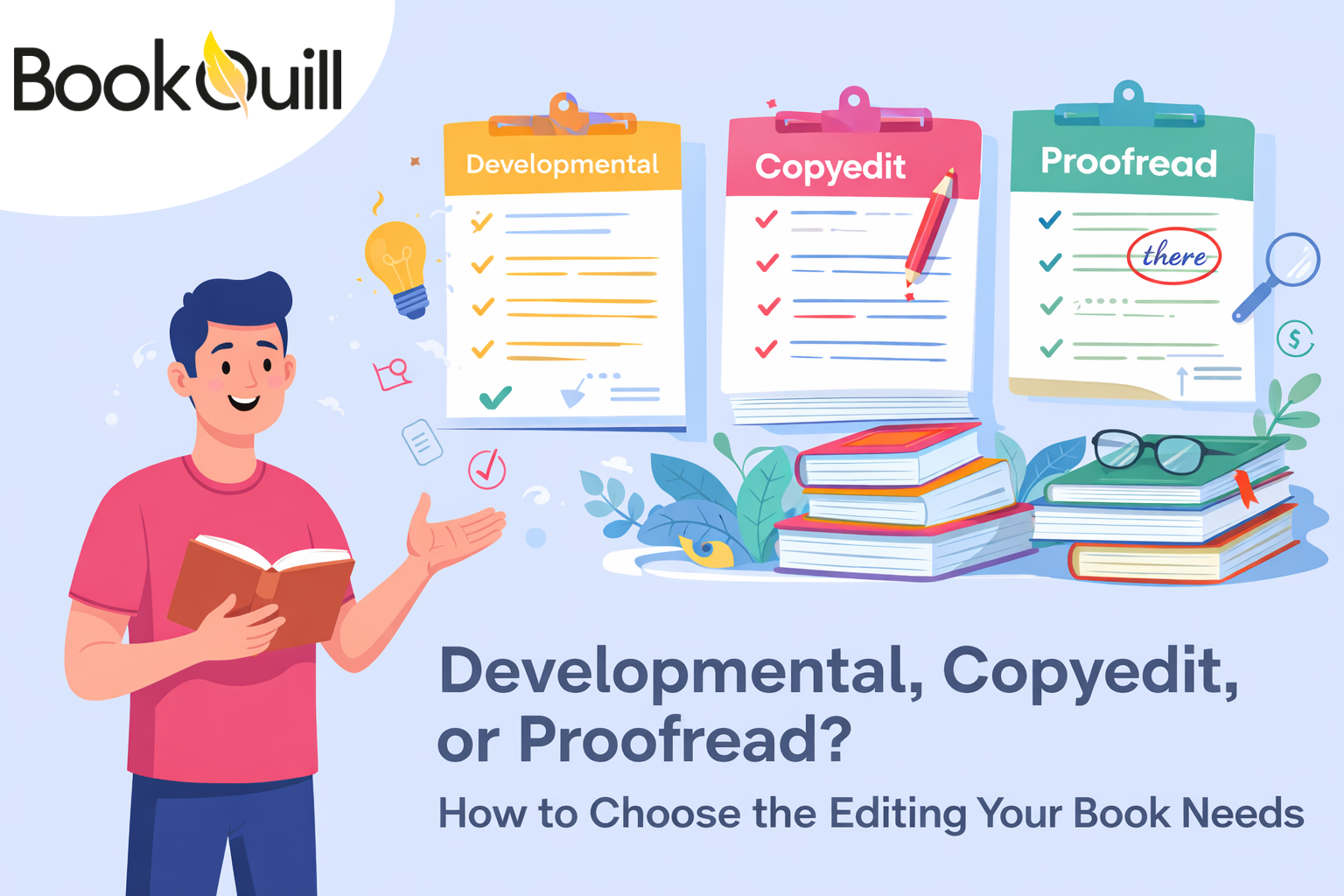Table of Contents
Explore Blogs
Trending on Ebook
How Authors Can Pitch Their Book for Adaptation

There was a time when authors wrote novels solely for readers’ enjoyment. However, the purpose of storytelling has evolved beyond the written page, with books increasingly being adapted into blockbuster films or binge-worthy TV series.
In fact, film adaptations of books gross 44% more at the U.K. box office and a remarkable 53% more worldwide than films based on original screenplays.
Authors hoping to see their stories on screen must know how to pitch a book for adaptation. For that, you have to understand the entertainment industry, build connections with key players, and create a comprehensive adaptation proposal. To learn all of this and more strategies for pitching your book, read our comprehensive guide below:
Key Takeaways
- Be Prepared – Your book should be polished and ready for adaptation before you even think about pitching it. Ensuring it’s in its best form can make a significant difference.
- Know Your Audience – Understand who would be most interested in adapting your book and why. Tailor your approach to capture their attention effectively.
- Perfect Your Pitch – A strong log line and visual aids can make your pitch unforgettable. Create a compelling presentation that highlights the USP of your story.
- Use Marketing Services – They can boost your book’s visibility. Seek help from the best book marketing services to maximize your reach and impact.
- Be Persistent – Rejection is part of the process. Take feedback and keep refining your approach to find success.
- Learn from Success – Study what worked in the book and what may work for the films. Analyzing successful examples can provide valuable insights for your journey.
What Makes a Book Attractive for Adaptation?
Wondering what producers and directors look for in a book? Have a look:
1. Special Themes
Stories with fresh perspectives or universal themes tend to stand out. If your book resonates emotionally, producers will be more interested. For example, the adaptation of “To Kill a Mockingbird” emphasized universal themes of justice and morality, making it a timeless favorite.
2. Strong Visual Elements
Books with vivid settings, memorable characters, and dramatic tension have an edge. Can someone see your story as a film or TV series? The adaptation of “Harry Potter” exemplifies how strong visual elements discussed in the book can translate into captivating on-screen experiences.
3. Commercial Potential
Novel adaptation is a business. If your novel already has an audience, it eventually creates hype. Even upcoming book adaptations often draw from bestselling or highly praised novels. The “Twilight” saga, with its established fan base, transitioned smoothly from page to screen, driving significant box office revenue.
How to Prepare Your Story for Adaptation
If your book isn’t ready for its close-up, producers won’t even glance at it. Here’s how to make your book irresistible:
1. Polish Your Manuscript
A sloppy manuscript is a no-go. Your book must be professionally edited and visually appealing. This means hiring a professional editor to fix grammatical errors, improve the flow, and enhance the readability of your manuscript. Additionally, consider having a professional cover designer create an eye-catching cover that reflects what your story is about.
2. Understand the Market
Research what types of adaptations are trending. This can be as simple as googling upcoming book adaptations or checking box office successes. Understanding the current market trends will help you tailor your pitch to what producers are looking for.
Keep an eye on popular genres, themes, and storytelling styles. Study successful adaptations like “Avatar” (2009, the most commercially successful movie of all time, grossing about $2.92 billion USD in box offices worldwide, to identify common elements that made them appealing.
Knowing the market will also help you position your book more effectively, whether it’s for a movie, TV series, or streaming platform.
3. Know Your Hook
What makes your book different? Is it the thrilling plot twist? A heartwarming underdog story? You need to know your hook and pitch it confidently. Your hook is the key element that makes your book worth being on screen.
Think about the most compelling aspects of your story and how they can be presented in a concise and engaging manner. Practice your pitch to ensure it’s clear and persuasive. A strong hook can make your book more memorable and increase its chances of being picked up for literary adaptation.
Crafting the Perfect Pitch
Out of the 109 English-language movies produced by Hollywood in 2023,25.7 percent had a production budget larger than 100 million U.S. dollars. To make your story the one that they not only adapt but are willing to spend a huge budget on, you have to:
1. Create a Killer Logline
Writing a compelling log line can hook potential adaptors. In one or two sentences, capture the core of your story and its visual potential. A powerful logline should convey the main conflict, unique premise, and emotional stakes.
For example, “A small-town girl faces her worst fears when a supernatural curse threatens her family in this chilling horror story.”
Remember, the logline should be clear, concise, and intriguing, enticing producers and screenwriters to want to know more. Consider including a high-concept idea or a unique twist that sets your story apart. Refining your logline is an iterative process, so keep testing and tweaking until it sounds powerful and compelling enough for the listeners.
2. Highlight Adaptation Potential
Explain why your book fits the screen. Mention visual or emotionally powerful scenes, characters that are most loved or wanted, and universal themes that are relatable to the wider audience. For instance, “Fans of the best book-to-film adaptations like The Hunger Games will love this action-packed scene.” Using comparisons to successful adaptations can help decision-makers see the potential and marketability of your story.
3. Add Visuals
Visual aids can significantly enhance your pitch by helping movie makers envision your story on the screen. Create a mood board that captures the aesthetic and tone of your book. Include concept art of main scenes or characters to give a tangible sense of the visual style.
If possible, produce a book trailer that demonstrates your story’s climaxes. These visuals can make your pitch more engaging and hopefully lead your book to movie adaptation by showing the cinematic potential of your narrative.
Where to Pitch Your Book
Now that your pitch is ready, where do you send it? You can’t just DM a Hollywood producer on Instagram and hope for the best. You have to reach out to these people:
1. Agents and Managers
Literary agents with experience in novel adaptation can be invaluable assets. These professionals have established connections within the film and television industry and can introduce you to producers, directors, and studios that are interested in adapting books. They can help negotiate contracts and ensure that your intellectual property is protected throughout the adaptation process.
Moreover, agents can provide insights into market trends and advise on how to position your book for maximum appeal. Finding the right agent involves researching their past successes and understanding their network, which can significantly boost your chances of landing a successful adaptation deal.
2. Production Companies
Many production houses turned books into movies and TV series. These studios often have a keen interest in finding compelling narratives that can be transformed into visual stories. Researching and targeting companies that have a history of working within your book’s genre can be the key.
Like, if you’ve written a fantasy novel, look for companies known for successful fantasy book adaptations. Building relationships with these companies can open doors to potential collaborations. Attending industry events and pitching your book directly to these companies can be effective strategies for getting your story noticed by the right people.
3. Streaming Platforms
With the rise of streaming platforms like Netflix, Hulu, and Amazon Prime Video, there are more opportunities than ever for book adaptations. These platforms are constantly seeking fresh and engaging content to attract subscribers. Pitching your book directly to streaming services can be a lucrative option, especially if your story aligns with their current programming needs.
Streaming platforms often have dedicated teams that evaluate potential adaptations, so crafting a strong pitch and presenting it strongly can increase your chances of success. Pinpointing the potential for episodic storytelling or a limited series format can also make your book more attractive to these services.
How BookQuill Can Help You Prepare Your Book Pitch They Can’t Refuse
Pitching your book for adaptation is a high-stakes game, and BookQuill ensures you step onto the field with everything in your favor. We can refine your book into a polished piece, ready to shine in front of producers and studios.
First, we offer comprehensive manuscript evaluations, identifying key strengths and visuals that scream “adaptation potential.” Our professional editors ensure your story is compelling, emotionally resonant, and impossible to ignore. A refined manuscript with strong pacing, vivid imagery, and dynamic characters becomes the foundation of your pitch.
Next, we create industry-standard pitch materials, from enticing loglines to professionally designed pitch decks. We highlight what makes your book stand out—whether it’s a twist, universal themes, or its alignment with trends.
Our marketing team amplifies your book’s visibility, establishing credibility through reviews, press coverage, and strategic campaigns. With our professional book marketing services, you can get a dedicated audience—something producers can’t overlook.
What to Do After Sending Your Pitch
Sending your pitch doesn’t mean everything is over. You have to do more, such as:
1. Follow Up Politely
After sending your pitch, it’s crucial to follow up politely. Don’t ghost them after sending your pitch. A simple email after two weeks can keep you on their radar. In your follow-up, thank them for considering your pitch and express your continued interest. Avoid being pushy or demanding; instead, be courteous and professional. This shows your dedication and respect for their time.
2. Handle Rejection Gracefully
Rejections aren’t the end. Even the most successful authors face rejection. According to Human Performance Technology by DTS, the first “Harry Potter” novel was rejected by 12 publishers, a fact almost incomprehensible given its status as a global phenomenon. When you receive a rejection, handle it gracefully. Thank the person for their time and any feedback they may have provided.
Use this feedback to refine and improve your pitch. Rejection is a common part of the process, so stay persistent and resilient. Each rejection is an opportunity to learn and enhance your approach, bringing you closer to success.
Learning From the Best Book-to-Film Adaptations
Some book-to-movie adaptations hit the nail on the head. Others, not so much. Here’s what the best ones have in common:
- Sticking to the Heart of the Story (To Kill a Mockingbird)
- Expanding the World (Game of Thrones)
- Fantastic Casting (The Hunger Games)
FAQs
What types of books are most often adapted into movies?
Books with universal themes, vivid settings, and strong emotional hooks are top candidates. Bestsellers and critically acclaimed novels have the best shot. For instance, the “Harry Potter” series captivated audiences with its magical world and deep emotional ties, making it a compelling choice for adaptation.
Should I self-publish or work with publishers to get an adaptation?
Both paths can work. Publishing might connect you with industry insiders faster due to their established networks and resources. However, self-published authors can succeed with strong marketing and pitching. You can hire affordable book marketing services for guidance.
What’s the role of an option agreement?
An option agreement gives a producer exclusive rights to adapt your book for a set period. It’s a common first step in the adaptation process, allowing the producer time to secure funding and further develop the project. If the project moves forward, it can lead to a full purchase agreement and production.
How can I make my book more visually appealing?
Focus on creating vivid scenes, memorable characters, and compelling dialogue that jump off the page. Use descriptive language to paint a picture in the reader’s mind, making it easier for filmmakers to visualize the story. Engaging visuals in your narrative can significantly enhance its appeal for adaptation.
Do I need an agent to pitch me for adaptation?
While not mandatory, an agent with experience in adaptations can open doors and negotiate contracts on your behalf. They have industry knowledge and connections that can be invaluable. Agents can also help refine your pitch and strategically position your book to attract interest from producers and studios.
How do I know if my book has adaptation potential?
Ask yourself if your story has universal appeal, strong characters, and a visually engaging plot. Feedback from editors or marketing professionals can also help. Consider if your book’s themes and narratives align with current market trends and audience interests. A compelling, visual, and emotionally connecting story is key.
About Author
Hi, my name is Zachary Stone I’m a book marketing nut — or, as I like to call myself, a “Shelf Marketer.” No, I don’t sell wooden shelves; I market the books that are left forgotten on them. If you want your book to be the next bestseller, I am your go-to person. I am here to remind you that it’s not just about writing a great story — it’s about building a buzz among people with great campaigns.




